Welcome to DU!
The truly grassroots left-of-center political community where regular people, not algorithms, drive the discussions and set the standards.
Join the community:
Create a free account
Support DU (and get rid of ads!):
Become a Star Member
Latest Breaking News
General Discussion
The DU Lounge
All Forums
Issue Forums
Culture Forums
Alliance Forums
Region Forums
Support Forums
Help & Search
Celerity
Celerity's Journal
Celerity's Journal
October 4, 2021

A sculptural facade modelled on traditional Islamic architecture is the focal point of the Brick Veil mosque that London studio Luca Poian Forms has proposed for a site in Preston, England. If built, the elliptical brick mosque will be positioned on an elevated hilltop site surrounded by roads on the northern edge of the city.

According to architect Luca Poian, director of Luca Poian Forms, the mosque would be visible from several vantage points and become an "iconic and memorable" landmark. "The building is conceived as an elliptical extrusion at the south-western end of the site and features an abstract and legible massing that is not only iconic and memorable but also highly kinetic," Poian told Dezeen. "The building's elliptical form, in fact, is designed to be experienced by kinetic observers, allowing them to perceive and appreciate the structure from various dynamic vantage points." Brick Veil was the winning entry of an international competition held by the Royal Royal Institute of British Architects for a landmark religious building for the site, which would become "a proud element of Preston's skyscape". The criteria also called for a building with a maximum of three storeys and a large prayer hall that could accommodate up to 250 prayer mats.
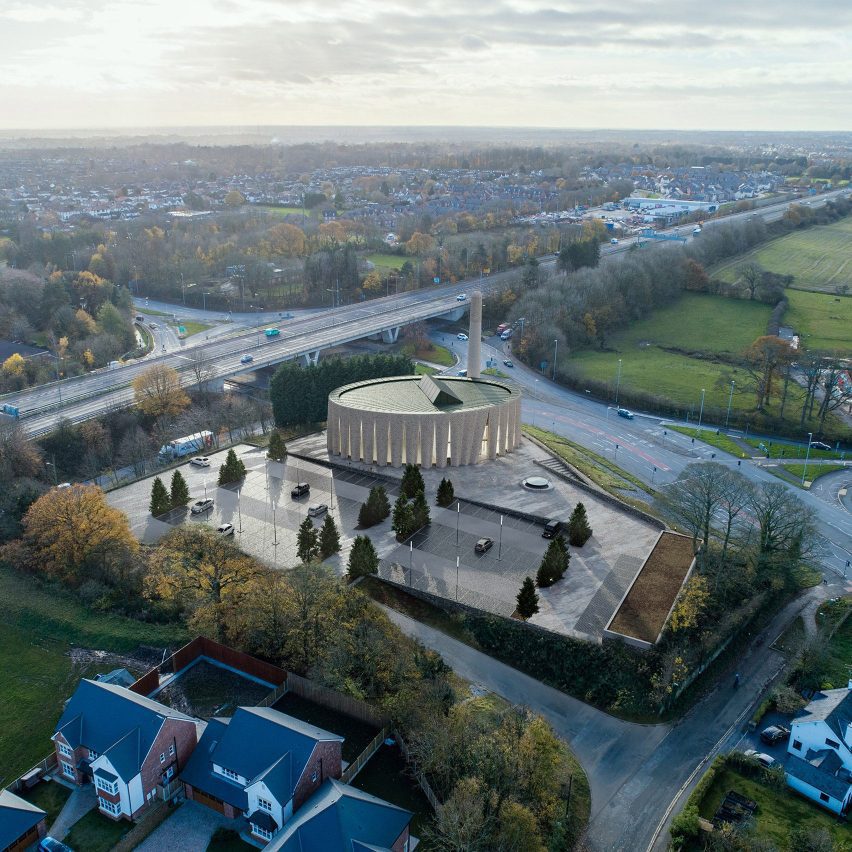
The focal point of Luca Poian Form's design is the brick facade that references Mashrabiyas – windows enclosed by latticed screens that are typically found in traditional Islamic architecture. Meanwhile, the use of brick nods to the history of textile manufacturing and the industrial buildings in Lancashire, the county in which Preston is located. Another reference to the area's industrial heritage is the brick minaret tower, which is intended to echo the county's old round cotton-mill chimneys. Minarets are often built close to or as part of mosques, offering space for the Islamic call to prayer.

Visitors to the mosque will enter the building from a ramp that weaves around the sloped site, offering a slow transition away from the city. Separate entrances for male and female visitors will be positioned on either side of the building, leading to their respective staircases and then prayer areas. There will also be a dedicated lift to ensure accessibility. This will be discreetly concealed within the structure of the minaret tower. The main prayer hall will be located on the ground floor behind the entrance areas, where it will be lit by natural light filtered through slender openings around the building's perimeter. Among the other facilities in the mosque will be a multi-purpose hall and library, located on the second floor and topped by a large skylight. While details of the mosque's interior design are yet to be disclosed, Poian said it will be "devoid of superfluous ornament" and that the building's structure will be exposed throughout. This is both for cost-saving reasons and to "infuse this sacred building with an inherent honesty and clarity", he said.

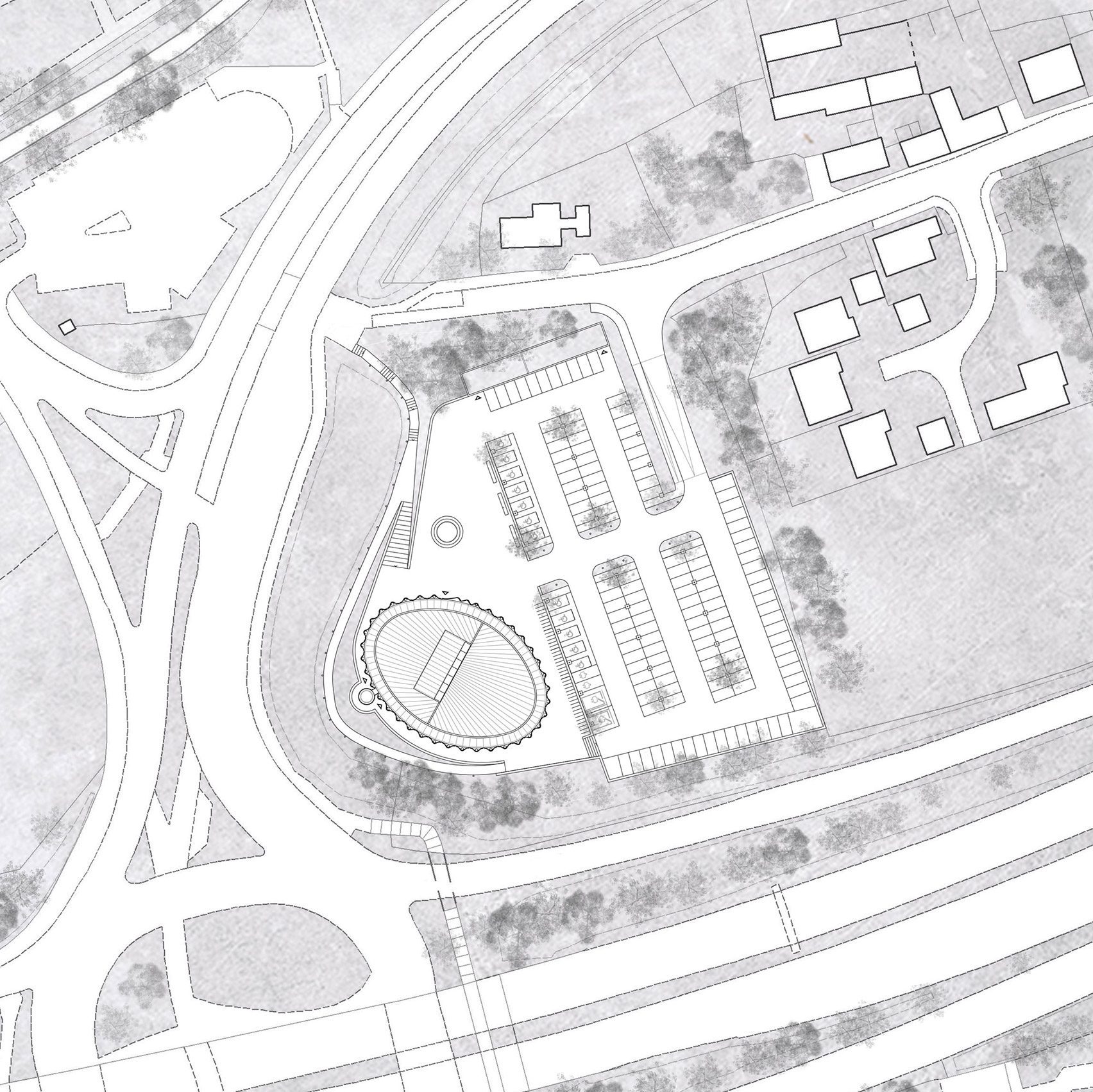

Luca Poian Forms designs decorative brick mosque for Preston
https://www.dezeen.com/2021/09/29/brick-veil-mosque-luca-poian-forms-preston/
A sculptural facade modelled on traditional Islamic architecture is the focal point of the Brick Veil mosque that London studio Luca Poian Forms has proposed for a site in Preston, England. If built, the elliptical brick mosque will be positioned on an elevated hilltop site surrounded by roads on the northern edge of the city.

According to architect Luca Poian, director of Luca Poian Forms, the mosque would be visible from several vantage points and become an "iconic and memorable" landmark. "The building is conceived as an elliptical extrusion at the south-western end of the site and features an abstract and legible massing that is not only iconic and memorable but also highly kinetic," Poian told Dezeen. "The building's elliptical form, in fact, is designed to be experienced by kinetic observers, allowing them to perceive and appreciate the structure from various dynamic vantage points." Brick Veil was the winning entry of an international competition held by the Royal Royal Institute of British Architects for a landmark religious building for the site, which would become "a proud element of Preston's skyscape". The criteria also called for a building with a maximum of three storeys and a large prayer hall that could accommodate up to 250 prayer mats.

The focal point of Luca Poian Form's design is the brick facade that references Mashrabiyas – windows enclosed by latticed screens that are typically found in traditional Islamic architecture. Meanwhile, the use of brick nods to the history of textile manufacturing and the industrial buildings in Lancashire, the county in which Preston is located. Another reference to the area's industrial heritage is the brick minaret tower, which is intended to echo the county's old round cotton-mill chimneys. Minarets are often built close to or as part of mosques, offering space for the Islamic call to prayer.

Visitors to the mosque will enter the building from a ramp that weaves around the sloped site, offering a slow transition away from the city. Separate entrances for male and female visitors will be positioned on either side of the building, leading to their respective staircases and then prayer areas. There will also be a dedicated lift to ensure accessibility. This will be discreetly concealed within the structure of the minaret tower. The main prayer hall will be located on the ground floor behind the entrance areas, where it will be lit by natural light filtered through slender openings around the building's perimeter. Among the other facilities in the mosque will be a multi-purpose hall and library, located on the second floor and topped by a large skylight. While details of the mosque's interior design are yet to be disclosed, Poian said it will be "devoid of superfluous ornament" and that the building's structure will be exposed throughout. This is both for cost-saving reasons and to "infuse this sacred building with an inherent honesty and clarity", he said.



October 4, 2021
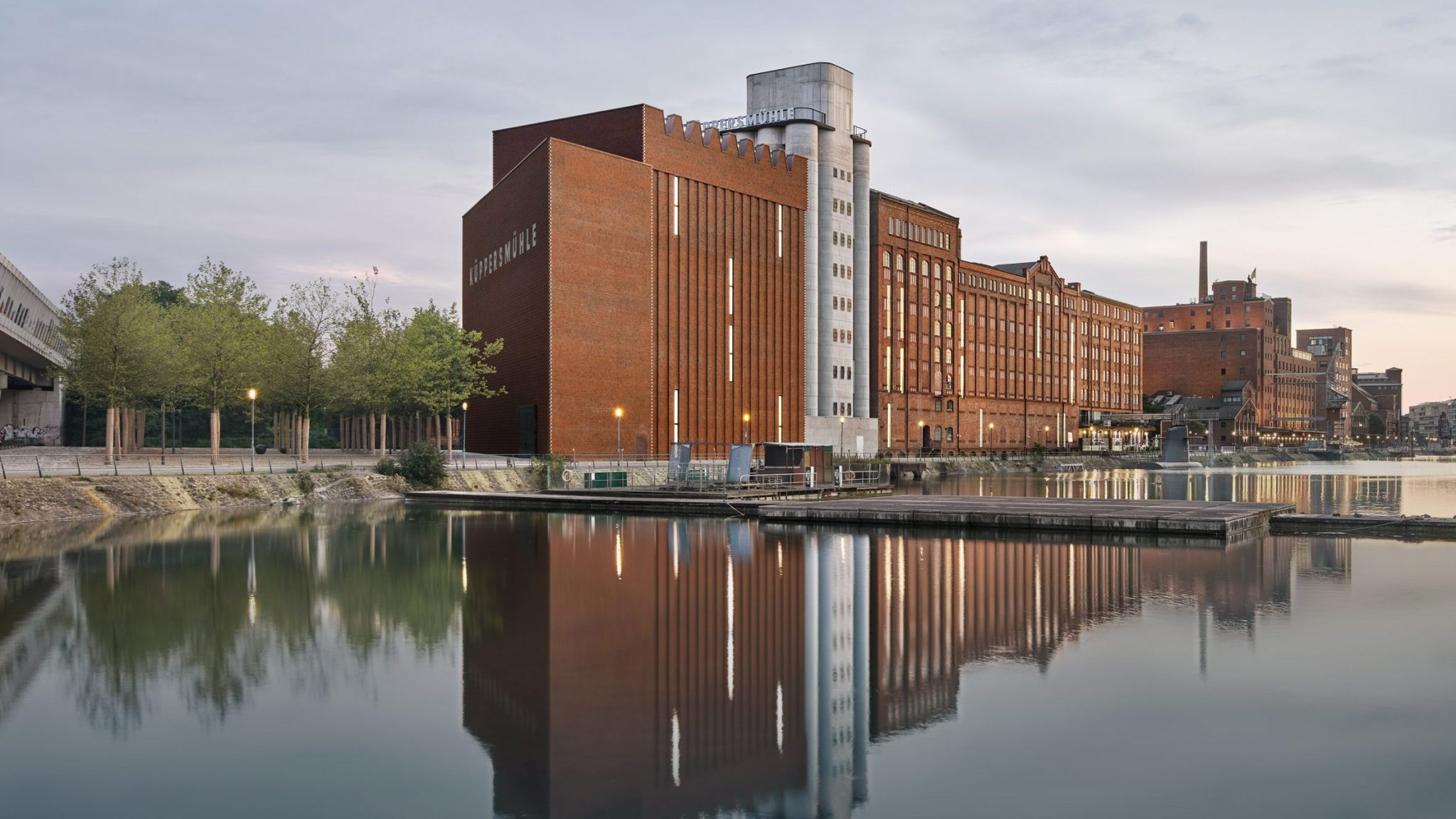
Swiss architecture studio Herzog & de Meuron has created an extension to the dockside MKM Museum Küppersmühle in Duisburg, Germany. The brick extension adds an additional 2,500 square metres of exhibition space to the MKM Museum Küppersmühle, which is located in a historic grain mill that was originally converted into a museum by Herzog & de Meuron in 1999.
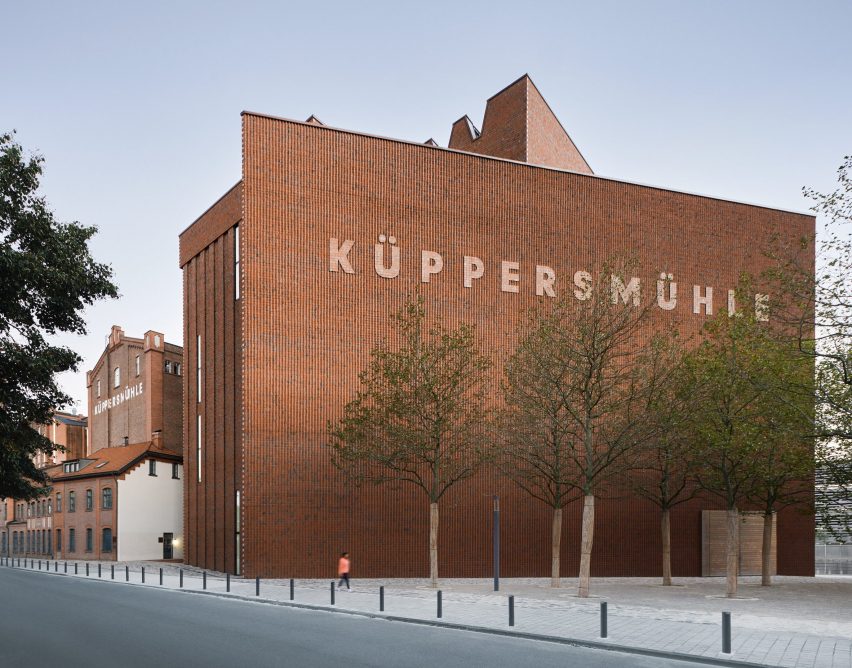
Set on the dockside, the four-storey extension was informed by the museum's existing 19th-century buildings that line the waterfront. "The extension accords with the sequence of impressive historical brick structures lining the dockside," said Herzog & de Meuron. "Consequently, the new structure completes the existing museum and harbour basin in a visually appropriate way, and forms a suitable conclusion to the row of buildings along the harbour basin. The new project constitutes an integrating and complementary architecture."

The extension contains additional gallery space for the museum, which displays an extensive collection of German and European post-war art. In total, 35 brightly lit gallery spaces have been created over the four stories. "Bricks on the outside, white cube on the inside," said the studio. "The MKM extension combines industrial culture with contemporary museum architecture."

The extension stands alongside a silo tower and its upper floors are connected to the museum's original building by a series of bridges that pass through the silos. According to the studio, the silos have been restored as "industrial monuments". They are topped with a viewing gallery, which will be open to the public when the weather allows.


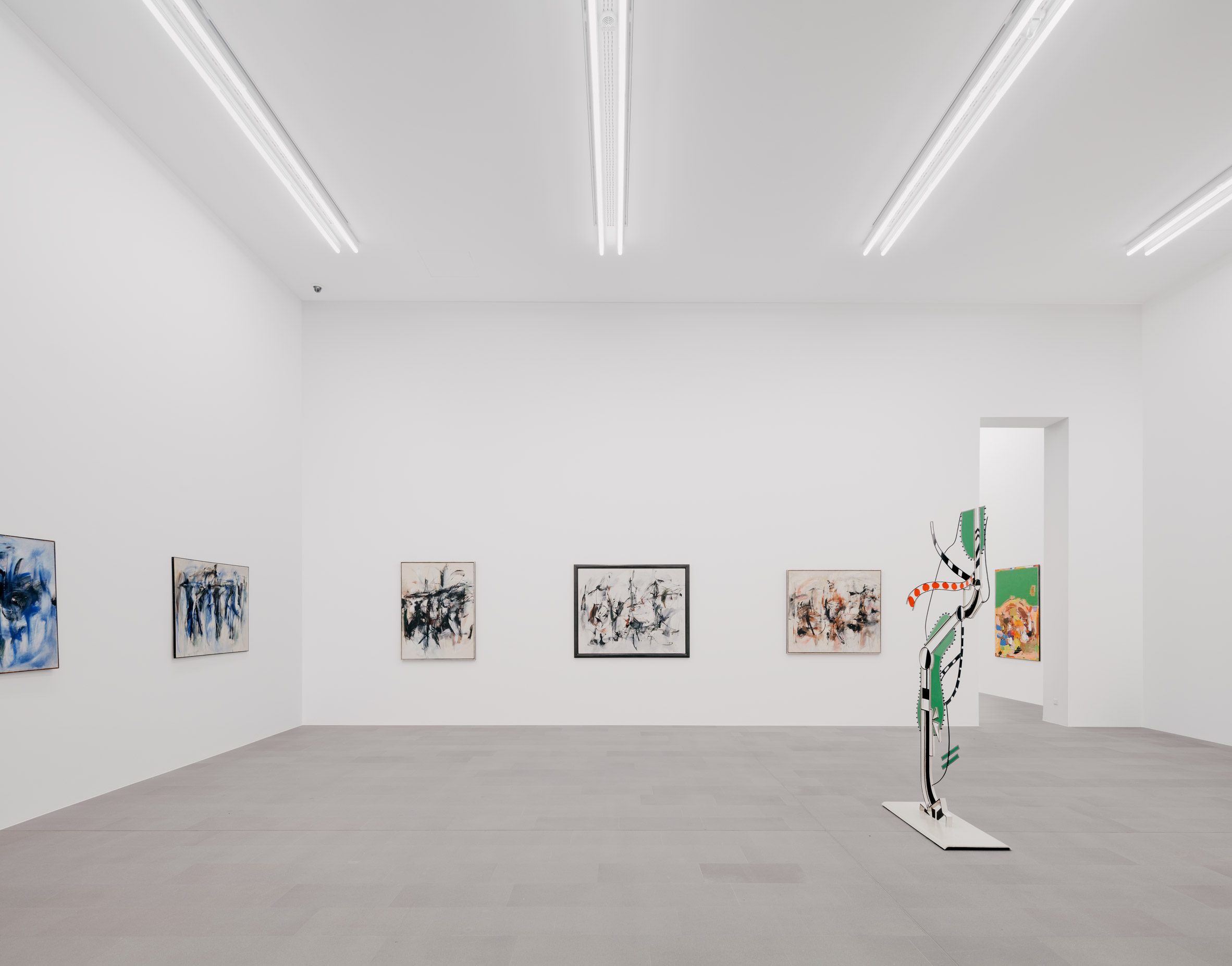



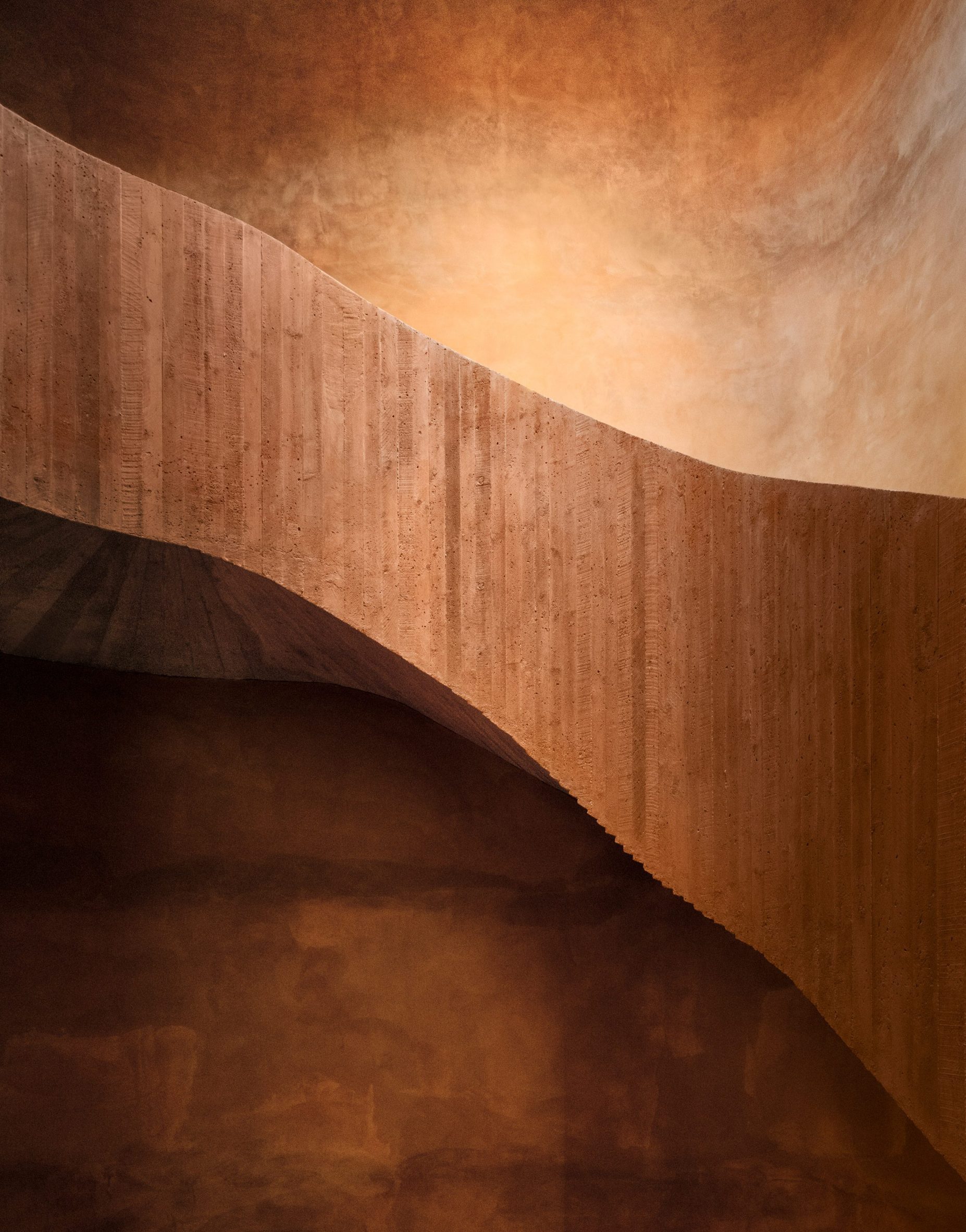
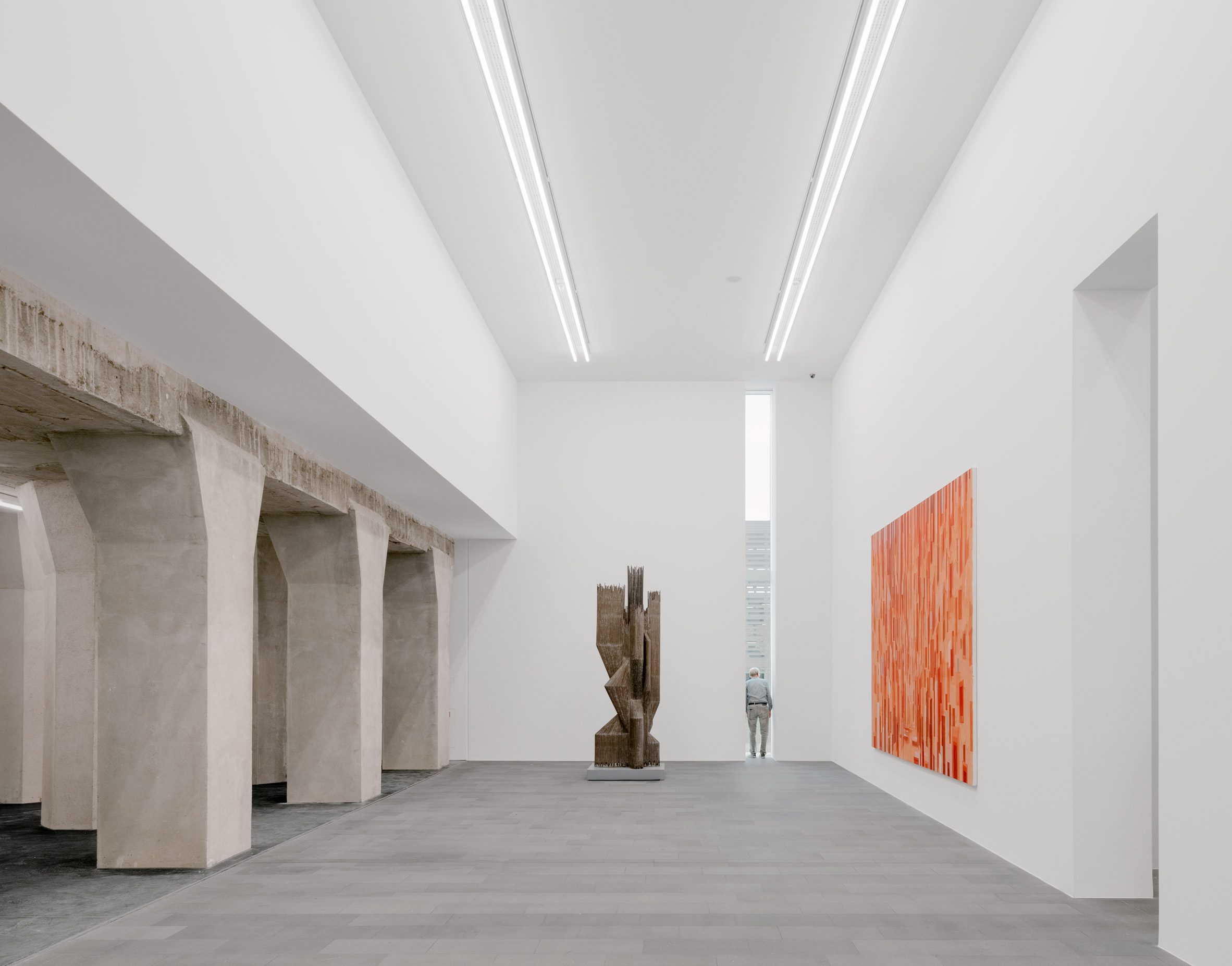
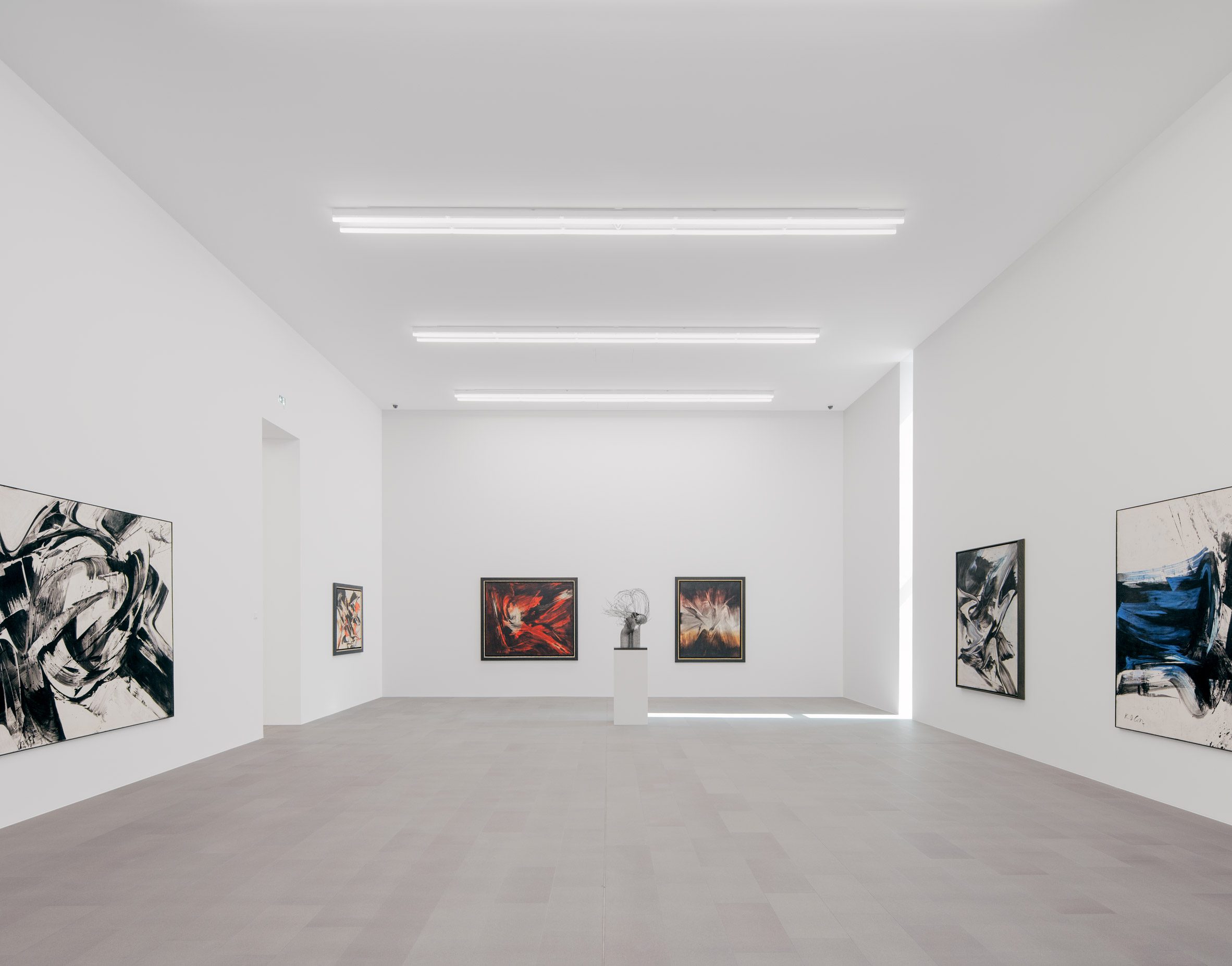
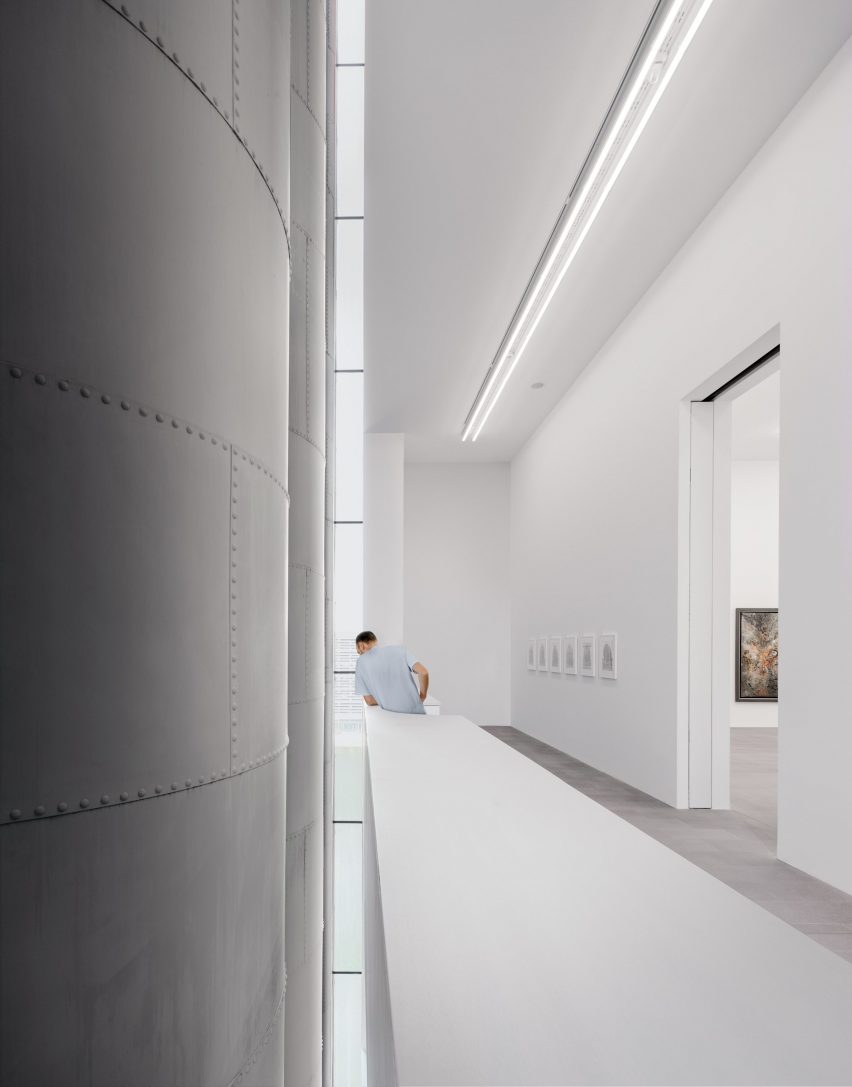
Herzog & de Meuron creates brick extension to its MKM Museum Kuppersmuhle
https://www.dezeen.com/2021/09/24/mkm-museum-kuppersmuhle-extension-herzog-de-meuron/
Swiss architecture studio Herzog & de Meuron has created an extension to the dockside MKM Museum Küppersmühle in Duisburg, Germany. The brick extension adds an additional 2,500 square metres of exhibition space to the MKM Museum Küppersmühle, which is located in a historic grain mill that was originally converted into a museum by Herzog & de Meuron in 1999.

Set on the dockside, the four-storey extension was informed by the museum's existing 19th-century buildings that line the waterfront. "The extension accords with the sequence of impressive historical brick structures lining the dockside," said Herzog & de Meuron. "Consequently, the new structure completes the existing museum and harbour basin in a visually appropriate way, and forms a suitable conclusion to the row of buildings along the harbour basin. The new project constitutes an integrating and complementary architecture."

The extension contains additional gallery space for the museum, which displays an extensive collection of German and European post-war art. In total, 35 brightly lit gallery spaces have been created over the four stories. "Bricks on the outside, white cube on the inside," said the studio. "The MKM extension combines industrial culture with contemporary museum architecture."

The extension stands alongside a silo tower and its upper floors are connected to the museum's original building by a series of bridges that pass through the silos. According to the studio, the silos have been restored as "industrial monuments". They are topped with a viewing gallery, which will be open to the public when the weather allows.










October 4, 2021
https://twitter.com/AndrewYang/status/1445037590827225090

https://www.andrewyang.com/blog/breaking-up-with-the-democratic-party
I changed my voting registration from ‘Democrat’ to ‘Independent’ today. It was a strangely emotional experience.
I registered as a Democrat back in 1995 when I was 20 years old to vote for Bill Clinton’s re-election. It was a no-brainer for me. I went to a college that was very liberal. I lived in New York City. Everyone around me was a Democrat. Bill Clinton vs. Bob Dole? Clinton was one of the youngest presidents when he was elected and seemed more in tune to me, as a 20 year old. Keep in mind that I grew up the son of immigrants and my family did not talk about politics at all growing up. I still have no idea how or even if my parents voted. I have a vague recollection of my Mom watching a debate and saying, “I don’t like him” but I can’t remember who she was referring to. She doesn’t remember either.
Throughout my twenties I remained a staunch Democrat, though like many others I was drawn primarily to national races. I co-hosted a small fundraiser for John Kerry’s campaign at a bar when I was 29 – I think we raised maybe $3,000. I thrilled to Barack Obama’s victory in 2008 and, to a lesser extent, his re-election in 2012. Around this time I was invited to the White House to receive recognition by the Obama White House as both a Champion of Change and a Presidential Ambassador of Global Entrepreneurship as the founder of a non-profit, Venture for America that helped create hundreds of jobs in the Midwest and the South. Bringing Evelyn to meet the President was a lot of fun. In 2016, I donated to Bernie Sanders’ campaign – everything he said struck me as true – but then voted for Hillary Clinton against Trump.
When Trump won, I was surprised and took it as a red flag and call to action. Having spent six years working in the Midwest and the South I believed I had some insight as to what had driven Trump’s victory. I spent several years making the case for what I believed was the major policy that could address it – Universal Basic Income. As you’d imagine, as a Democratic presidential candidate, I met a lot of Democrats around the country. Literally thousands. At first, many didn’t know what to make of the odd Asian candidate talking about giving everyone money. But over time I established deep relationships with some of the local leaders who have worked in party politics for years. Al Womble in Iowa, Steve Marchand in New Hampshire, Jermaine Johnson in South Carolina and others.
I also became friends with some of the other candidates out in the field. Cory Booker, Michael Bennet, Pete Buttigieg and Beto O’Rourke are people I’d consider friends who are motivated by the right things. As I’ve become more of a household name, I’ve worked with many senior officials. I headlined several fundraisers for the DNC and participated in fundraising appeals. I was a surrogate for Joe for months. I spent weeks in Georgia trying to help win the seats for Jon Ossoff and Reverend Raphael Warnock, helping raise millions to do so. I’m proud of helping to activate Asian American voters in what I believed were historic races.
snip
Andrew Yang to leave the Democratic Party
https://www.theguardian.com/us-news/live/2021/oct/04/joe-biden-debt-ceiling-republicans-democrats-congress-senate-us-politics-latest?CMP=share_btn_tw&page=with:block-615b16c98f0871ecf8faae29#block-615b16c98f0871ecf8faae29Andrew Yang announced today that he was leaving the Democratic party to register as an independent.
Yang, who attracted a staunch following after his 2020 presidential run on a platform that celebrated math, nerdiness and a universal basic income, posted on his website that despite having been registered as a Democrat since 1995, he was “confident that no longer being a Democrat is the right thing”.
“Breaking up with the Democratic Party feels like the right thing to do because I believe I can have a greater impact this way,” he wrote. “ “My goal is to do as much as I can to advance our society,” Yang wrote. “There are phenomenal public servants doing great work every day – but our system is stuck. It is stuck in part because polarization is getting worse than ever.
“Many of the people I know are doing all of the good they can – but their impact is constrained. Now that I’m not a member of one party or another, I feel like I can be even more honest about both the system and the people in it.” Yang lost the race for mayor of New York earlier this year as a Democrat.
Yang, who attracted a staunch following after his 2020 presidential run on a platform that celebrated math, nerdiness and a universal basic income, posted on his website that despite having been registered as a Democrat since 1995, he was “confident that no longer being a Democrat is the right thing”.
“Breaking up with the Democratic Party feels like the right thing to do because I believe I can have a greater impact this way,” he wrote. “ “My goal is to do as much as I can to advance our society,” Yang wrote. “There are phenomenal public servants doing great work every day – but our system is stuck. It is stuck in part because polarization is getting worse than ever.
“Many of the people I know are doing all of the good they can – but their impact is constrained. Now that I’m not a member of one party or another, I feel like I can be even more honest about both the system and the people in it.” Yang lost the race for mayor of New York earlier this year as a Democrat.
https://twitter.com/AndrewYang/status/1445037590827225090

https://www.andrewyang.com/blog/breaking-up-with-the-democratic-party
I changed my voting registration from ‘Democrat’ to ‘Independent’ today. It was a strangely emotional experience.
I registered as a Democrat back in 1995 when I was 20 years old to vote for Bill Clinton’s re-election. It was a no-brainer for me. I went to a college that was very liberal. I lived in New York City. Everyone around me was a Democrat. Bill Clinton vs. Bob Dole? Clinton was one of the youngest presidents when he was elected and seemed more in tune to me, as a 20 year old. Keep in mind that I grew up the son of immigrants and my family did not talk about politics at all growing up. I still have no idea how or even if my parents voted. I have a vague recollection of my Mom watching a debate and saying, “I don’t like him” but I can’t remember who she was referring to. She doesn’t remember either.
Throughout my twenties I remained a staunch Democrat, though like many others I was drawn primarily to national races. I co-hosted a small fundraiser for John Kerry’s campaign at a bar when I was 29 – I think we raised maybe $3,000. I thrilled to Barack Obama’s victory in 2008 and, to a lesser extent, his re-election in 2012. Around this time I was invited to the White House to receive recognition by the Obama White House as both a Champion of Change and a Presidential Ambassador of Global Entrepreneurship as the founder of a non-profit, Venture for America that helped create hundreds of jobs in the Midwest and the South. Bringing Evelyn to meet the President was a lot of fun. In 2016, I donated to Bernie Sanders’ campaign – everything he said struck me as true – but then voted for Hillary Clinton against Trump.
When Trump won, I was surprised and took it as a red flag and call to action. Having spent six years working in the Midwest and the South I believed I had some insight as to what had driven Trump’s victory. I spent several years making the case for what I believed was the major policy that could address it – Universal Basic Income. As you’d imagine, as a Democratic presidential candidate, I met a lot of Democrats around the country. Literally thousands. At first, many didn’t know what to make of the odd Asian candidate talking about giving everyone money. But over time I established deep relationships with some of the local leaders who have worked in party politics for years. Al Womble in Iowa, Steve Marchand in New Hampshire, Jermaine Johnson in South Carolina and others.
I also became friends with some of the other candidates out in the field. Cory Booker, Michael Bennet, Pete Buttigieg and Beto O’Rourke are people I’d consider friends who are motivated by the right things. As I’ve become more of a household name, I’ve worked with many senior officials. I headlined several fundraisers for the DNC and participated in fundraising appeals. I was a surrogate for Joe for months. I spent weeks in Georgia trying to help win the seats for Jon Ossoff and Reverend Raphael Warnock, helping raise millions to do so. I’m proud of helping to activate Asian American voters in what I believed were historic races.
snip
October 4, 2021
https://crooksandliars.com/2021/10/aoc-congratulates-president-biden-good
On CBS' Face The Nation, Congresswoman Alexandria Ocasio-Cortez remarked that Pres. Joe Biden has done everything in good faith, as he is trying to get his legislation passed. “I think that President Biden has been a good faith partner to the entire Democratic party,” Ocasio-Cortez said. AOC said that Biden is a moderate, but "reaches out and actually tries to understand our perspective and that is why I am fighting for his agenda."
It has been frustrating legislating a bold agenda when you have senators like Joe Manchin and Kyrsten Sinema refusing to negotiate in good faith after such a tumultuous last administration. The American people spoke out strongly in electing President Biden overwhelmingly, and flipping the Senate to the Democratic party. Yet these two rogue Democrats refuse to get on board to fulfil the will of the people. But the fight continues.
The mainstream media, though, seems to be pining for the days of Traitor Trump's unhinged antics, so they've been claiming (falsely) that Biden's agenda is in "crisis." Eric Boehlert in his newsletter writes, "Everybody knows the DC media’s approved story-line these days — battered by 'crises,' the president’s approval rating has 'collapsed.'
https://twitter.com/brianstelter/status/1444711652511948803
So what happens when a news outlet produces a poll that shows President Joe Biden with a healthy 50% approval rating? If you’re the AP, you stick to the script and spin it as bad news. Fact: In four years in office, Trump never once hit 50% approval." Wanting to pass major legislation for the Democratic party that helps the majority of the American people is always a chore, and yet the Beltway Media always feels compelled to couch it in right-wing talking points.
snip
AOC Hails President Biden As 'A Good Faith Partner'
The New York congresswoman was highly complimentary of Biden's willingness to negotiate with progressives.https://crooksandliars.com/2021/10/aoc-congratulates-president-biden-good
On CBS' Face The Nation, Congresswoman Alexandria Ocasio-Cortez remarked that Pres. Joe Biden has done everything in good faith, as he is trying to get his legislation passed. “I think that President Biden has been a good faith partner to the entire Democratic party,” Ocasio-Cortez said. AOC said that Biden is a moderate, but "reaches out and actually tries to understand our perspective and that is why I am fighting for his agenda."
It has been frustrating legislating a bold agenda when you have senators like Joe Manchin and Kyrsten Sinema refusing to negotiate in good faith after such a tumultuous last administration. The American people spoke out strongly in electing President Biden overwhelmingly, and flipping the Senate to the Democratic party. Yet these two rogue Democrats refuse to get on board to fulfil the will of the people. But the fight continues.
The mainstream media, though, seems to be pining for the days of Traitor Trump's unhinged antics, so they've been claiming (falsely) that Biden's agenda is in "crisis." Eric Boehlert in his newsletter writes, "Everybody knows the DC media’s approved story-line these days — battered by 'crises,' the president’s approval rating has 'collapsed.'
https://twitter.com/brianstelter/status/1444711652511948803
So what happens when a news outlet produces a poll that shows President Joe Biden with a healthy 50% approval rating? If you’re the AP, you stick to the script and spin it as bad news. Fact: In four years in office, Trump never once hit 50% approval." Wanting to pass major legislation for the Democratic party that helps the majority of the American people is always a chore, and yet the Beltway Media always feels compelled to couch it in right-wing talking points.
snip
October 4, 2021

https://www.thedailybeast.com/bridgerton-stylist-marc-pilcher-reportedly-dies-of-covid-three-weeks-after-emmy-win
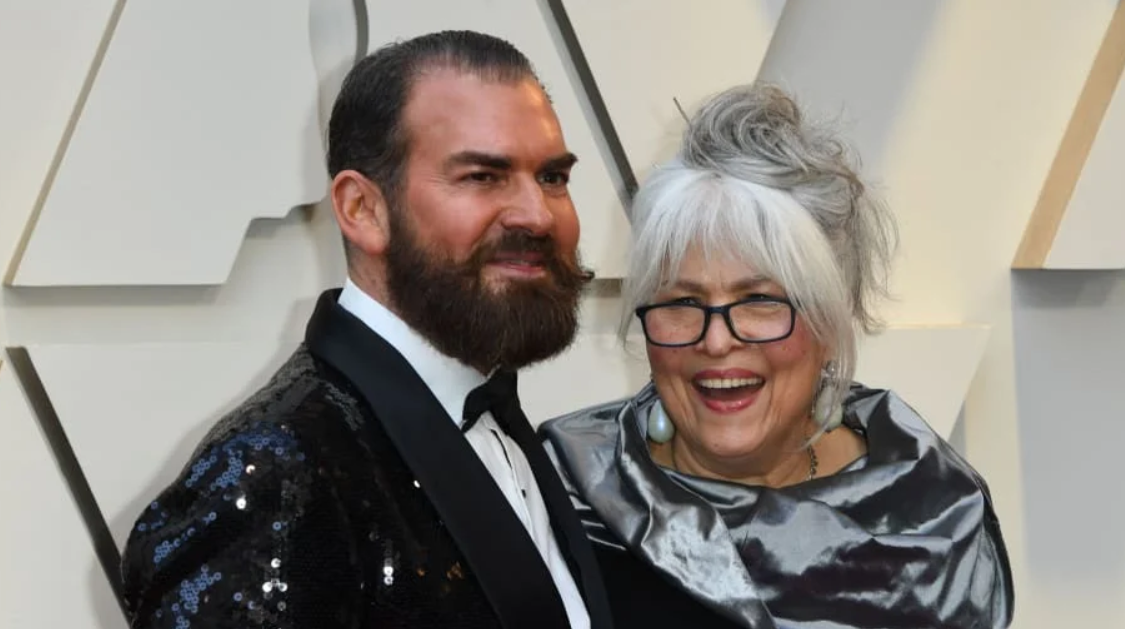
Last month, Bridgerton stylist Marc Pilcher picked up his first Emmy for best period hair-styling after decades in the business. Three weeks on, he reportedly lost his life to the coronavirus. The stars of Bridgerton have paid tribute to their award-winning colleague, with actress Nicola Coughlan writing on Twitter: “So heartbroken by the loss of Marc Pilcher, the brilliant and visionary Hair and Makeup designer for Bridgerton Season One. Marc was so passionate about his work and so tremendously talented. Not even a month ago he won his first Emmy award.” She added: “Please also use this as a reminder that COVID is still a very real and present danger, please get vaccinated and mask up to protect yourself and others.” According to his website, Pilcher started his style career in 1988 and spent 15 years working in theatre before moving onto TV and movies. In recent years, he worked on Mary Queen of Scots and and Downton Abbey.

https://www.dailymail.co.uk/news/article-10057095/Bridgerton-stylist-Marc-Pilcher-dies-Covid.html
'Bridgerton' Stylist Reportedly Dies of COVID Three Weeks After Emmy Win

https://www.thedailybeast.com/bridgerton-stylist-marc-pilcher-reportedly-dies-of-covid-three-weeks-after-emmy-win

Last month, Bridgerton stylist Marc Pilcher picked up his first Emmy for best period hair-styling after decades in the business. Three weeks on, he reportedly lost his life to the coronavirus. The stars of Bridgerton have paid tribute to their award-winning colleague, with actress Nicola Coughlan writing on Twitter: “So heartbroken by the loss of Marc Pilcher, the brilliant and visionary Hair and Makeup designer for Bridgerton Season One. Marc was so passionate about his work and so tremendously talented. Not even a month ago he won his first Emmy award.” She added: “Please also use this as a reminder that COVID is still a very real and present danger, please get vaccinated and mask up to protect yourself and others.” According to his website, Pilcher started his style career in 1988 and spent 15 years working in theatre before moving onto TV and movies. In recent years, he worked on Mary Queen of Scots and and Downton Abbey.

https://www.dailymail.co.uk/news/article-10057095/Bridgerton-stylist-Marc-Pilcher-dies-Covid.html
October 4, 2021
https://www.nytimes.com/2021/09/27/dining/west-africa-food-stories-cooking.html

Yaji, a fragrant combination of dried spices and aromatics, finishes roasted carrots in this warming recipe.
There was a time, just a couple of years ago, when I would invite two dozen strangers over to my apartment for dinner. Twice a month, I would cook and serve dishes like fish pepper soup, seasoned with up to 10 different spices; fork-tender goat, braised for hours in a fiery red obe ata; baobab granitas; and lemongrass coconut soup over springy tapioca pearls — all in an effort to connect with the food I grew up eating in Lagos, Nigeria. I have revisited those memories in the last few months, amused at what I once thought were the necessary logistics of serving four courses to a group of lively diners — timing the dishes, finding places for coats, getting the bar ready, to say nothing of today’s face shields, temperature checks and social distancing. And, although I was consumed with those details at the time, they were far from the whole picture. Beyond the meal and the hosting duties, the dinners were helping me answer a question I only now realize I was asking: What happens to us when we share our cuisine, and what story does our food reveal? My career has always been shaped by my love of food. My years as a professional cook and recipe developer have taught me that the dishes we create hold a narrative, and that recipes speak to the harmonious way ingredients come together. Recipes tell of a place, of a culture and the humans behind it.

Carrots are halved lengthwise, then tossed with oil and roasted until caramelized in spots.
Just before the pandemic, I began writing a cookbook about the food I’ve always known and loved and longed for: the many cuisines of Lagos, Nigeria’s largest city and a cultural nexus. Its food embodies the contributions of those who have lived within it for centuries and those who have migrated to it. The memories I had of these cuisines, I knew, were like the recollections we have of a favorite childhood haunt or a film watched when our hearts were full (or freshly broken) — almost dreamlike with the passing of time.
Diasporas — some recent, others culminating over hundreds or thousands of years — make up much of American cuisine. The African continent’s imprint on it has inspired almost as much engaging scholarship as it has irresistible dishes. The broader region I come from, West Africa, has influenced so much of what we consider essential to the American palate, that its contributions almost feel like a foregone conclusion. Ingredients, cooking methods and preservation techniques I know from home are all present in American cuisine. But I don’t experience the continent’s foodways in the past tense. To me, they are all part of the story I’ve been telling with the food I love to make, and part of the story that I will be unraveling as I write this monthly column. In essence, my work in this space will strive to continue what I set out to explore and understand with my dinners — how ingredients, food and cooking can shape and determine our idea of home.

A relish of scallions, lemon, yaji spice, paprika and parsley tops the carrots, enlivening them.
In many ways, the pandemic has kept us closer to home than ever. It has also brought for so many of us a kind of great downsizing (briefly, I hope) of the number of people with whom we share a meal. And, for those of us who love to cook, it has sent us deeper into our pantries. There, in some ways, we find the stories we all tell with our food, sharpen the ideas we hold about where we come from and realize what has influenced us along the way. Where once I would have slapped two wide cast-iron griddles over my entire range to sear off pounds of beef suya for newly arrived guests, I now draw from the quickest and easiest methods of connecting with ingredients I love. Yaji, an essential pantry spice for many West Africans, is something that should be in every kitchen. This recipe, a simple side of roast carrots with yaji-spiced relish, is the result of my rummaging through my cabinets for a taste of home and grabbing an agreeable vessel. Sweet, caramelized carrots roasted on a sheet pan never fail, but you could use this on meats or any other seasonal vegetables. If instead of yaji, you have a spice that reminds you of home, it will work just as well.
snip

https://cooking.nytimes.com/recipes/1022586-roasted-carrots-with-yaji-spice-relish
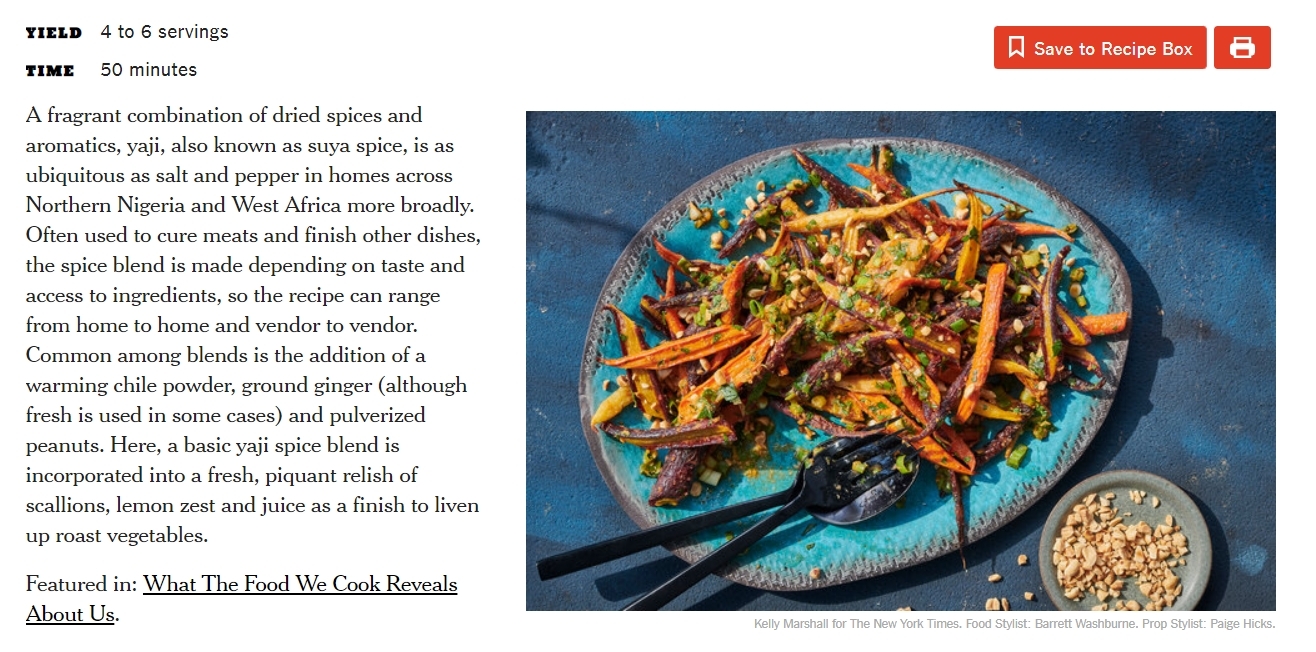

What the Food We Cook Reveals About Us
In her new monthly column, Yewande Komolafe returns to the food of West Africa to examine how it shaped her cooking, and her idea of home.https://www.nytimes.com/2021/09/27/dining/west-africa-food-stories-cooking.html

Yaji, a fragrant combination of dried spices and aromatics, finishes roasted carrots in this warming recipe.
There was a time, just a couple of years ago, when I would invite two dozen strangers over to my apartment for dinner. Twice a month, I would cook and serve dishes like fish pepper soup, seasoned with up to 10 different spices; fork-tender goat, braised for hours in a fiery red obe ata; baobab granitas; and lemongrass coconut soup over springy tapioca pearls — all in an effort to connect with the food I grew up eating in Lagos, Nigeria. I have revisited those memories in the last few months, amused at what I once thought were the necessary logistics of serving four courses to a group of lively diners — timing the dishes, finding places for coats, getting the bar ready, to say nothing of today’s face shields, temperature checks and social distancing. And, although I was consumed with those details at the time, they were far from the whole picture. Beyond the meal and the hosting duties, the dinners were helping me answer a question I only now realize I was asking: What happens to us when we share our cuisine, and what story does our food reveal? My career has always been shaped by my love of food. My years as a professional cook and recipe developer have taught me that the dishes we create hold a narrative, and that recipes speak to the harmonious way ingredients come together. Recipes tell of a place, of a culture and the humans behind it.

Carrots are halved lengthwise, then tossed with oil and roasted until caramelized in spots.
Just before the pandemic, I began writing a cookbook about the food I’ve always known and loved and longed for: the many cuisines of Lagos, Nigeria’s largest city and a cultural nexus. Its food embodies the contributions of those who have lived within it for centuries and those who have migrated to it. The memories I had of these cuisines, I knew, were like the recollections we have of a favorite childhood haunt or a film watched when our hearts were full (or freshly broken) — almost dreamlike with the passing of time.
Diasporas — some recent, others culminating over hundreds or thousands of years — make up much of American cuisine. The African continent’s imprint on it has inspired almost as much engaging scholarship as it has irresistible dishes. The broader region I come from, West Africa, has influenced so much of what we consider essential to the American palate, that its contributions almost feel like a foregone conclusion. Ingredients, cooking methods and preservation techniques I know from home are all present in American cuisine. But I don’t experience the continent’s foodways in the past tense. To me, they are all part of the story I’ve been telling with the food I love to make, and part of the story that I will be unraveling as I write this monthly column. In essence, my work in this space will strive to continue what I set out to explore and understand with my dinners — how ingredients, food and cooking can shape and determine our idea of home.

A relish of scallions, lemon, yaji spice, paprika and parsley tops the carrots, enlivening them.
In many ways, the pandemic has kept us closer to home than ever. It has also brought for so many of us a kind of great downsizing (briefly, I hope) of the number of people with whom we share a meal. And, for those of us who love to cook, it has sent us deeper into our pantries. There, in some ways, we find the stories we all tell with our food, sharpen the ideas we hold about where we come from and realize what has influenced us along the way. Where once I would have slapped two wide cast-iron griddles over my entire range to sear off pounds of beef suya for newly arrived guests, I now draw from the quickest and easiest methods of connecting with ingredients I love. Yaji, an essential pantry spice for many West Africans, is something that should be in every kitchen. This recipe, a simple side of roast carrots with yaji-spiced relish, is the result of my rummaging through my cabinets for a taste of home and grabbing an agreeable vessel. Sweet, caramelized carrots roasted on a sheet pan never fail, but you could use this on meats or any other seasonal vegetables. If instead of yaji, you have a spice that reminds you of home, it will work just as well.
snip

https://cooking.nytimes.com/recipes/1022586-roasted-carrots-with-yaji-spice-relish


October 4, 2021

Despite petrol shortages and empty shelves, Labour is adrift—and Johnson may press the Northern Ireland protocol nuclear button.
https://socialeurope.eu/britain-heads-further-down-the-brexit-rabbit-hole

At my local petrol station a cadre of young men have suddenly appeared, in high-visibility jackets, to instruct car drivers in the fine art of the jammed-nose-to-tail refill. Each pump has three nozzles, for diesel and petrol—with some careful driving, and shouted instructions, two cars can use one at the same time. That doesn’t stop the queue backing up 30 metres into the roadway, hazard lights flashing. After a while the jacketed men flip the makeshift sign, from ‘no petrol cans’ to ‘no petrol’, and the commotion ends. This is what happens when a country runs short of 100,000 truck and tanker drivers and the government says ‘don’t panic’. In the supermarket next door there are rows of empty shelves. Fresh vegetables are a problem, fruit is a bigger problem and the remaining flowers look sad and wilted. The primary cause of the food shortage is said to be the absence of carbon dioxide for processing—itself a side-effect of the soaring price of natural gas. But the absence of 100,000 trained heavy-good-vehicle drivers is not helping. Anecdotally—everything becomes anecdotal in a crisis such as this—major trucking firms are hiking pay for drivers to the equivalent of a senior teacher and headhunting entire departments full of refuse-lorry drivers from local government. Meanwhile, in every other shop or pub a scribbled notice is taped to the window: ‘we are hiring’.
Acute impact
How did Britain find itself at the wrong end of an energy-security crisis and a labour shortage at the same time? Before uttering the one-word answer we must, in the name of objectivity, concede the global contributing factors. There is a surge of demand driven by recovery from the pandemic—a recovery in which central banks have refused to stop stimulating prices and funding government spending. That has driven global supply shortages in goods as varied as silicon chips and natural gas. Meanwhile the spot price for shipping a 40-foot container from Shanghai to Rotterdam has risen by 535 per cent in a year. But the acute impact of these trends on Britain is down primarily to ‘Brexit’—with government insouciance and decades of deregulation thrown in. In the past week we have seen retail energy suppliers with a customer base numbering millions go bust. Their customers are transferred to bigger, more expensive suppliers and as the winter fuel spend begins this alone will drive inflation. So will the pay rises employers are throwing at anyone who can drive a truck, which in turn will trigger rises among the precariously-employed young workforce who can suddenly pick and choose their jobs.
Not a normal country
In a normal country, the government’s popularity would take a hit. But not in Britain. The crisis is being touted gleefully by Tory MPs as the outcome of ending ‘cheap foreign labour’. The subtext: stick it out, resist the temptation to issue unlimited visas to skilled European workers and there will be a permanent hike in wage rates across the semi-skilled economy. As for the gas, food, petrol and manufactured-goods shortages, these—as always with Boris Johnson—are somebody else’s fault. The polls tell a story of rising discontent with the performance of Johnson’s government. Yet this is allied to a stubborn refusal to break with the Conservatives, particularly among their ‘C2DE’ (lower-middle-class and manual-worker) supporters, for whom Brexit was supposed to solve everything. Among less well-off and less-educated voters surveyed by YouGov, for example, general discontent with Johnson’s government is now running at 47 per cent, compared with just 27 per cent approval—similar to where it was before the ‘vaccine bounce’ equalised the numbers at 36 per cent in May. Significantly, 52 per cent of the same voters now think the Tories are handling Brexit itself badly. And Johnson’s approval rating has been deeply negative since the middle of 2020, when a series of screw-ups and scandals over the management of the pandemic began to take their toll. But voter intention still puts the Conservatives way ahead of Labour. Even though Tory electoral support has waned over the summer, they are still on 40 per cent, compared with Labour’s 34 per cent and a combined 21 per cent for the overtly anti-Brexit Liberal Democrats and Greens and Scottish and Welsh nationalists.
Opportunity missed
Britain retains a large, suburban, conservative middle class, with elderly, property-owning, private-pension recipients the core of Tory support. So long as the elderly, property-owning state pensioners of ex-industrial working-class towns continue to form a bloc with them, they can deliver a solid 40 per cent support base for Conservatism. This is distributed across all constituencies, unlike that for Labour and other progressive voters, who are concentrated in the cities but outvoted in the towns under the UK’s first-past-the-post electoral system. For Labour, this is already an opportunity that has come and gone. The gas crisis is clearly the result of Britain’s departure from Europe’s integrated energy market, as well as neglect of domestic storage capacity. The driver shortage is a direct outcome of the Brexit abandonment of freedom of movement. Yet the Labour leader, Keir Starmer, used his party’s annual conference in Brighton last week publicly to renege on his pledge to nationalise energy, water, rail and postal services. This, he said, would only be done if it represented ‘value for money’. His frontbenchers have meanwhile studiously avoided linking the crisis to Brexit, fearing they would alienate the elderly, social-conservative voters they need to switch back to Labour. As for freedom of movement, it is dead as a Labour commitment for the same reason.
snip
Britain heads further down the Brexit rabbit-hole

Despite petrol shortages and empty shelves, Labour is adrift—and Johnson may press the Northern Ireland protocol nuclear button.
https://socialeurope.eu/britain-heads-further-down-the-brexit-rabbit-hole

At my local petrol station a cadre of young men have suddenly appeared, in high-visibility jackets, to instruct car drivers in the fine art of the jammed-nose-to-tail refill. Each pump has three nozzles, for diesel and petrol—with some careful driving, and shouted instructions, two cars can use one at the same time. That doesn’t stop the queue backing up 30 metres into the roadway, hazard lights flashing. After a while the jacketed men flip the makeshift sign, from ‘no petrol cans’ to ‘no petrol’, and the commotion ends. This is what happens when a country runs short of 100,000 truck and tanker drivers and the government says ‘don’t panic’. In the supermarket next door there are rows of empty shelves. Fresh vegetables are a problem, fruit is a bigger problem and the remaining flowers look sad and wilted. The primary cause of the food shortage is said to be the absence of carbon dioxide for processing—itself a side-effect of the soaring price of natural gas. But the absence of 100,000 trained heavy-good-vehicle drivers is not helping. Anecdotally—everything becomes anecdotal in a crisis such as this—major trucking firms are hiking pay for drivers to the equivalent of a senior teacher and headhunting entire departments full of refuse-lorry drivers from local government. Meanwhile, in every other shop or pub a scribbled notice is taped to the window: ‘we are hiring’.
Acute impact
How did Britain find itself at the wrong end of an energy-security crisis and a labour shortage at the same time? Before uttering the one-word answer we must, in the name of objectivity, concede the global contributing factors. There is a surge of demand driven by recovery from the pandemic—a recovery in which central banks have refused to stop stimulating prices and funding government spending. That has driven global supply shortages in goods as varied as silicon chips and natural gas. Meanwhile the spot price for shipping a 40-foot container from Shanghai to Rotterdam has risen by 535 per cent in a year. But the acute impact of these trends on Britain is down primarily to ‘Brexit’—with government insouciance and decades of deregulation thrown in. In the past week we have seen retail energy suppliers with a customer base numbering millions go bust. Their customers are transferred to bigger, more expensive suppliers and as the winter fuel spend begins this alone will drive inflation. So will the pay rises employers are throwing at anyone who can drive a truck, which in turn will trigger rises among the precariously-employed young workforce who can suddenly pick and choose their jobs.
Not a normal country
In a normal country, the government’s popularity would take a hit. But not in Britain. The crisis is being touted gleefully by Tory MPs as the outcome of ending ‘cheap foreign labour’. The subtext: stick it out, resist the temptation to issue unlimited visas to skilled European workers and there will be a permanent hike in wage rates across the semi-skilled economy. As for the gas, food, petrol and manufactured-goods shortages, these—as always with Boris Johnson—are somebody else’s fault. The polls tell a story of rising discontent with the performance of Johnson’s government. Yet this is allied to a stubborn refusal to break with the Conservatives, particularly among their ‘C2DE’ (lower-middle-class and manual-worker) supporters, for whom Brexit was supposed to solve everything. Among less well-off and less-educated voters surveyed by YouGov, for example, general discontent with Johnson’s government is now running at 47 per cent, compared with just 27 per cent approval—similar to where it was before the ‘vaccine bounce’ equalised the numbers at 36 per cent in May. Significantly, 52 per cent of the same voters now think the Tories are handling Brexit itself badly. And Johnson’s approval rating has been deeply negative since the middle of 2020, when a series of screw-ups and scandals over the management of the pandemic began to take their toll. But voter intention still puts the Conservatives way ahead of Labour. Even though Tory electoral support has waned over the summer, they are still on 40 per cent, compared with Labour’s 34 per cent and a combined 21 per cent for the overtly anti-Brexit Liberal Democrats and Greens and Scottish and Welsh nationalists.
Opportunity missed
Britain retains a large, suburban, conservative middle class, with elderly, property-owning, private-pension recipients the core of Tory support. So long as the elderly, property-owning state pensioners of ex-industrial working-class towns continue to form a bloc with them, they can deliver a solid 40 per cent support base for Conservatism. This is distributed across all constituencies, unlike that for Labour and other progressive voters, who are concentrated in the cities but outvoted in the towns under the UK’s first-past-the-post electoral system. For Labour, this is already an opportunity that has come and gone. The gas crisis is clearly the result of Britain’s departure from Europe’s integrated energy market, as well as neglect of domestic storage capacity. The driver shortage is a direct outcome of the Brexit abandonment of freedom of movement. Yet the Labour leader, Keir Starmer, used his party’s annual conference in Brighton last week publicly to renege on his pledge to nationalise energy, water, rail and postal services. This, he said, would only be done if it represented ‘value for money’. His frontbenchers have meanwhile studiously avoided linking the crisis to Brexit, fearing they would alienate the elderly, social-conservative voters they need to switch back to Labour. As for freedom of movement, it is dead as a Labour commitment for the same reason.
snip
October 4, 2021
https://thebanter.substack.com/p/ex-trumpers-are-trying-to-exonerate

WASHINGTON, DC -- Before we dig in today, a little about me: I truly despise contributing to a Trump loyalist’s attempt at self-absolution after four years of tyrannical idiocracy in the White House. Yet what we’re going to discuss here is too important to ignore. The aforementioned self-absolution is exactly what former White House press secretary Stephanie Grisham is attempting to do with her new tell-all book about her time working for Trump, the first one-term loser in 30 years. We’ll cover a few revelations in the book that are noteworthy and, if true, add to the validity of what we’ve been saying about Grisham’s former boss for more than six years. Before we get to the big items, there are, of course, a few silly and bizarre things from the book:

The “uh, yes sir” is an example of the self-absolution I’m talking about here. It’s clearly an attempt by Grisham to backpedal away from her former boss. In this case, her nonplussed quote is meant to stir up empathy in the reader. “She sounds so confused and annoyed,” we’re meant to think. Meanwhile, Grisham discusses two instances in which Trump cozied up to dictators. First, the obvious linkage between Trump and Putin is further vindicated. During the G20 summit in Osaka, Japan, Trump was due to meet in private with Vladimir Putin. But before they held their one-on-one meeting, Trump described his planned charade to the Russian autocrat: “Okay, I’m going to act a little tougher with you for a few minutes. But it’s for the cameras, and after they leave we’ll talk. You understand.” The most important phrases here are “act a little tougher,” which clearly underscores the fact that Trump’s true intention was to kiss Putin’s ass in the meeting, and “it’s for the cameras.” He might as well have belted out a rendition of “Memory” from Cats -- I mean, as long as he’s putting on a phony-baloney show, why not a shabby cat costume and a song, too?
Likewise, any perceived “toughness” was all an act -- a shitty, flimsy act since Trump was never, ever “a little tougher” with Putin. The closest he ever came was saying, “And probably no one has been tougher to Russia than Donald Trump,” which isn’t an indication of toughness at all, especially since he hedged with the “probably” tossed in there. Nevertheless, here we have a Trump White House insider further establishing that Trump was desperate to keep Putin as happy as possible, going so far as to tell Putin that even a minor display of toughness was all bullshit. Why? I think we all know, and hopefully the Department of Justice will get around to presenting Trump’s dozen instances of criminal obstruction of justice, per the Mueller Report, to a grand jury. Grisham also reported that Trump was obsessed with moving the press out of the James Brady briefing room in the West Wing. Obviously, Trump considers the press to be “the enemy of the people” and so on -- the same old “fake news” meme. But it was a trip to North Korea that ultimately “inspired” Trump to order Grisham to work on a new location. Yes, the oppressive communist dictatorship was inspirational to Trump, manifesting an attack against the free press clause of the First Amendment.
Accompanying the story is another one of Grisham’s attempts at self-absolution to reverse-thrusters away from Trump. In this case, she wrote: “I researched different places we could put them other than the press briefing room. Each time the president asked me about my progress on the matter, I let him know I was still working on options.” She gave him a non-answer answer, and as we all know, the press was never removed from the White House. To be clear: it’s critical that we continue to hear from former Trump staffers and especially reputable journalists like Bob Woodward and Robert Costa about what happened. At the very least, it’s a matter of writing the accurate history of this ongoing political emergency. But where were Grisham and the others while Trump was president? Why weren’t they brave enough to step forward with what they knew? The fullness of the historical record is crucial here, make no mistake, but waiting to go public after he’s gone (for now) only serves the self-interests of the author. Do not forgive or forget what co-conspirators and apparatchiks like Grisham helped to manifest. They’re speaking out now, but while they had a chance to make a difference, they refused to speak. After all, there’s book money to be made after the fact, right? As Ella Wheeler Wilcox wrote: “To sin by silence, when we should protest, makes cowards out of men.”
snip
Ex-Trumpers Are Trying To Exonerate Themselves. We Must Not Let Them.
Trump's former White House press secretary Stephanie Grisham is attempting self-absolution by publishing a tell-all book.https://thebanter.substack.com/p/ex-trumpers-are-trying-to-exonerate

WASHINGTON, DC -- Before we dig in today, a little about me: I truly despise contributing to a Trump loyalist’s attempt at self-absolution after four years of tyrannical idiocracy in the White House. Yet what we’re going to discuss here is too important to ignore. The aforementioned self-absolution is exactly what former White House press secretary Stephanie Grisham is attempting to do with her new tell-all book about her time working for Trump, the first one-term loser in 30 years. We’ll cover a few revelations in the book that are noteworthy and, if true, add to the validity of what we’ve been saying about Grisham’s former boss for more than six years. Before we get to the big items, there are, of course, a few silly and bizarre things from the book:

The “uh, yes sir” is an example of the self-absolution I’m talking about here. It’s clearly an attempt by Grisham to backpedal away from her former boss. In this case, her nonplussed quote is meant to stir up empathy in the reader. “She sounds so confused and annoyed,” we’re meant to think. Meanwhile, Grisham discusses two instances in which Trump cozied up to dictators. First, the obvious linkage between Trump and Putin is further vindicated. During the G20 summit in Osaka, Japan, Trump was due to meet in private with Vladimir Putin. But before they held their one-on-one meeting, Trump described his planned charade to the Russian autocrat: “Okay, I’m going to act a little tougher with you for a few minutes. But it’s for the cameras, and after they leave we’ll talk. You understand.” The most important phrases here are “act a little tougher,” which clearly underscores the fact that Trump’s true intention was to kiss Putin’s ass in the meeting, and “it’s for the cameras.” He might as well have belted out a rendition of “Memory” from Cats -- I mean, as long as he’s putting on a phony-baloney show, why not a shabby cat costume and a song, too?
Likewise, any perceived “toughness” was all an act -- a shitty, flimsy act since Trump was never, ever “a little tougher” with Putin. The closest he ever came was saying, “And probably no one has been tougher to Russia than Donald Trump,” which isn’t an indication of toughness at all, especially since he hedged with the “probably” tossed in there. Nevertheless, here we have a Trump White House insider further establishing that Trump was desperate to keep Putin as happy as possible, going so far as to tell Putin that even a minor display of toughness was all bullshit. Why? I think we all know, and hopefully the Department of Justice will get around to presenting Trump’s dozen instances of criminal obstruction of justice, per the Mueller Report, to a grand jury. Grisham also reported that Trump was obsessed with moving the press out of the James Brady briefing room in the West Wing. Obviously, Trump considers the press to be “the enemy of the people” and so on -- the same old “fake news” meme. But it was a trip to North Korea that ultimately “inspired” Trump to order Grisham to work on a new location. Yes, the oppressive communist dictatorship was inspirational to Trump, manifesting an attack against the free press clause of the First Amendment.
Accompanying the story is another one of Grisham’s attempts at self-absolution to reverse-thrusters away from Trump. In this case, she wrote: “I researched different places we could put them other than the press briefing room. Each time the president asked me about my progress on the matter, I let him know I was still working on options.” She gave him a non-answer answer, and as we all know, the press was never removed from the White House. To be clear: it’s critical that we continue to hear from former Trump staffers and especially reputable journalists like Bob Woodward and Robert Costa about what happened. At the very least, it’s a matter of writing the accurate history of this ongoing political emergency. But where were Grisham and the others while Trump was president? Why weren’t they brave enough to step forward with what they knew? The fullness of the historical record is crucial here, make no mistake, but waiting to go public after he’s gone (for now) only serves the self-interests of the author. Do not forgive or forget what co-conspirators and apparatchiks like Grisham helped to manifest. They’re speaking out now, but while they had a chance to make a difference, they refused to speak. After all, there’s book money to be made after the fact, right? As Ella Wheeler Wilcox wrote: “To sin by silence, when we should protest, makes cowards out of men.”
snip
October 4, 2021
https://www.theguardian.com/us-news/2021/oct/01/apple-amazon-microsoft-disney-lobby-groups-climate-bill-analysis
Some of America’s most prominent companies, including Apple, Amazon, Microsoft and Disney, are backing business groups that are fighting landmark climate legislation, despite their own promises to combat the climate crisis, a new analysis has found. A clutch of corporate lobby groups and organizations have mobilized to oppose the proposed $3.5tn budget bill put forward by Democrats, which contains unprecedented measures to drive down planet-heating gases. The reconciliation bill has been called the “the most significant climate action in our country’s history” by Chuck Schumer, the Democratic leader in the US Senate. Most large US corporations have expressed concern over the climate crisis or announced their own goals to cut greenhouse gases. Jeff Bezos, one of the world’s richest people, has said that the climate crisis is the “biggest threat to our planet” and the company he founded, Amazon, has created a pledge for businesses to cut their emissions to net zero by 2040. Microsoft has promised to be “carbon negative” within a decade from now and Disney is aiming to use only renewable-sourced electricity within the same timeframe.
But these leading companies, and others, either support or actively steer the very lobby groups that are attempting to sink the bill that carries the weight of Joe Biden’s ambitions to tackle the climate crisis, threatening one of the last major legislative efforts that will help decide whether parts of the world plunge into a new, barely livable climatic state. “Major corporations love to tell us how committed they are to addressing the climate crisis and building a sustainable future, but behind closed doors, they are funding the very industry trade groups that are fighting tooth and nail to stop the biggest climate change bill ever,” said Kyle Herrig, president of watchdog group Accountable.US, which compiled the analysis. None of the companies contacted by the Guardian would rebuke the stance of the lobby groups they are part of and none said they would review their links to these groups. “Hiding behind these shady groups doesn’t just put our environment at risk – it puts these companies’ household names and reputations in serious jeopardy,” Herrig said.
The US Chamber of Commerce has vowed to “do everything we can to prevent this tax raising, job killing reconciliation bill from becoming law”. The leading business lobby group’s board includes executives from companies including Microsoft, Intuit, United Airlines and Deloitte, which have all expressed concern over climate change – Deloitte even includes teaching the climate crisis to employees in its staff training – and have made various promises to reduce emissions. Another group, the Business Roundtable, has said it is “deeply concerned” about the passage of the bill, largely because it raises taxes on the wealthy. The organization is made up of company chief executives, including Apple’s Tim Cook, who has called for stronger action on the climate emergency from governments and businesses. Other members include Andy Jassy, chief executive of Amazon, Sundar Pichai, who heads Google’s parent company Alphabet, and Darren Woods, chief executive of the oil giant Exxon.
The Pharmaceutical Research and Manufacturers of America, a trade group that includes Bayer and AstraZeneca among its members, has run adverts attacking the proposed bill. The Rate Coalition, another lobby group that has Disney, FedEx and Verizon as members, is also planning an advertising blitz to help kill off the legislation while the National Association of Manufacturers – backed by Johnson & Johnson, Dow and Goodyear – has said it is attempting to upend the bill “in every way you can imagine”. This blitz threatens legislation that already faces a perilous path through Congress, with the president needing every Senate Democrat to vote for the package for it to pass. Joe Manchin, the centrist Democrat from West Virginia who is a major recipient of donations from the fossil fuel industry, has said the climate section of the bill “makes no sense” and has demanded that subsidies for coal, oil and gas remain in place. Republicans universally oppose the bill.
snip
Apple and Disney among companies backing groups against US climate bill. Amazon and Microsoft also
supporting groups fighting legislation despite promises to combat the climate crisis, analysis findshttps://www.theguardian.com/us-news/2021/oct/01/apple-amazon-microsoft-disney-lobby-groups-climate-bill-analysis
Some of America’s most prominent companies, including Apple, Amazon, Microsoft and Disney, are backing business groups that are fighting landmark climate legislation, despite their own promises to combat the climate crisis, a new analysis has found. A clutch of corporate lobby groups and organizations have mobilized to oppose the proposed $3.5tn budget bill put forward by Democrats, which contains unprecedented measures to drive down planet-heating gases. The reconciliation bill has been called the “the most significant climate action in our country’s history” by Chuck Schumer, the Democratic leader in the US Senate. Most large US corporations have expressed concern over the climate crisis or announced their own goals to cut greenhouse gases. Jeff Bezos, one of the world’s richest people, has said that the climate crisis is the “biggest threat to our planet” and the company he founded, Amazon, has created a pledge for businesses to cut their emissions to net zero by 2040. Microsoft has promised to be “carbon negative” within a decade from now and Disney is aiming to use only renewable-sourced electricity within the same timeframe.
But these leading companies, and others, either support or actively steer the very lobby groups that are attempting to sink the bill that carries the weight of Joe Biden’s ambitions to tackle the climate crisis, threatening one of the last major legislative efforts that will help decide whether parts of the world plunge into a new, barely livable climatic state. “Major corporations love to tell us how committed they are to addressing the climate crisis and building a sustainable future, but behind closed doors, they are funding the very industry trade groups that are fighting tooth and nail to stop the biggest climate change bill ever,” said Kyle Herrig, president of watchdog group Accountable.US, which compiled the analysis. None of the companies contacted by the Guardian would rebuke the stance of the lobby groups they are part of and none said they would review their links to these groups. “Hiding behind these shady groups doesn’t just put our environment at risk – it puts these companies’ household names and reputations in serious jeopardy,” Herrig said.
The US Chamber of Commerce has vowed to “do everything we can to prevent this tax raising, job killing reconciliation bill from becoming law”. The leading business lobby group’s board includes executives from companies including Microsoft, Intuit, United Airlines and Deloitte, which have all expressed concern over climate change – Deloitte even includes teaching the climate crisis to employees in its staff training – and have made various promises to reduce emissions. Another group, the Business Roundtable, has said it is “deeply concerned” about the passage of the bill, largely because it raises taxes on the wealthy. The organization is made up of company chief executives, including Apple’s Tim Cook, who has called for stronger action on the climate emergency from governments and businesses. Other members include Andy Jassy, chief executive of Amazon, Sundar Pichai, who heads Google’s parent company Alphabet, and Darren Woods, chief executive of the oil giant Exxon.
The Pharmaceutical Research and Manufacturers of America, a trade group that includes Bayer and AstraZeneca among its members, has run adverts attacking the proposed bill. The Rate Coalition, another lobby group that has Disney, FedEx and Verizon as members, is also planning an advertising blitz to help kill off the legislation while the National Association of Manufacturers – backed by Johnson & Johnson, Dow and Goodyear – has said it is attempting to upend the bill “in every way you can imagine”. This blitz threatens legislation that already faces a perilous path through Congress, with the president needing every Senate Democrat to vote for the package for it to pass. Joe Manchin, the centrist Democrat from West Virginia who is a major recipient of donations from the fossil fuel industry, has said the climate section of the bill “makes no sense” and has demanded that subsidies for coal, oil and gas remain in place. Republicans universally oppose the bill.
snip
October 4, 2021
https://ra.co/features/3924



snip
'The Sound Of Sheffield': Remembering Punk Provocateur Richard H. Kirk (Cabaret Voltaire founder)
We select five songs that defined the Cabaret Voltaire founder's musical legacy.https://ra.co/features/3924



snip
Profile Information
Gender: FemaleHometown: London
Home country: US/UK/Sweden
Current location: Stockholm, Sweden
Member since: Sun Jul 1, 2018, 07:25 PM
Number of posts: 43,579